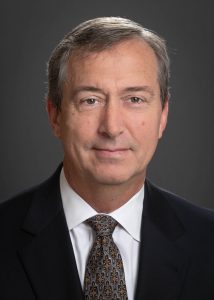ABR Executive Director Brent Wagner, MD, MBA, recently sat down to answer a few questions about some of the many initiatives the organization will undertake in 2025.
There’s been a lot of discussion about the new diagnostic radiology oral certifying exam, which starts in 2028. What are the biggest priorities in 2025 regarding preparation for the exam?
Much of the work will be performed by our information technology and exam services teams. Here’s a breakdown:

IT
- End-to-end automation of the scheduling process before and during oral exams. Continued improvements to the reliability and scalability of the exam platform.
- Improvements to the interface used by volunteers to create oral exam items, including enhanced image presentation tools.
- Fully automated test assembly of oral exams from cases created by volunteers.
Exam Services
- Work with Trustees to complete content creation tools needed by volunteers to submit cases and generate case sets.
- Finalize a new, streamlined exam development process and timeline for all types of ABR assessments (computer-based, oral, and OLA).
- Realign teams of developers to balance workload when new DR oral exam committees are formed.
- Set up committee infrastructure.
- Work with Trustees to populate committees and train new committee members.
Together, the completion of these items will position us so that volunteers can begin creating DR oral case content in January 2026.
The ABR has a new board president who started her duties in late September. What should diplomates and candidates know about Cheri Canon, MD?
Dr. Canon has a breadth of experience in organizational structures, operations, and strategies. As a long-serving ABR volunteer in a variety of roles, and a keen insight that balances the strong commitment to ABR priorities, her talents as a leader will allow us to continue to move forward as an evolving and learning organization that is responsive to the public mission and ABR diplomates.
The ABR is scheduled to start work on a refresh of its website this year. What are the biggest priorities for the updated site?
In 2025, we plan to update the ABR website based on user feedback. Some of our goals include simplifying navigation to allow quicker access to information, improving the search functionality, and highlighting news and current events that are important to our stakeholders. Additionally, we’ll enhance the information available to the public to highlight how ABR-certified physicians and physicists provide high quality care to the benefit of patients.
During the past couple of years, the ABR has stepped up stakeholder engagement in discussions about many topics, including Initial Certification exams. What has the organization learned about stakeholder willingness to share their thoughts on how the ABR conducts its operations?
The conversations we have had with external stakeholders over recent years have been invaluable in supporting refinement and improvements in our certification programs. The volunteer board members and ABR staff agree that we must be intentional in our efforts to seek input and address concerns to avoid complacency and biases that may arise from a focus that is inappropriately inwardly focused. The benefits of these interactions have been significant, including many occasions where there have been conflicting views, thoughtfully and respectfully presented, within external professional societies and among individuals.
Over the past few months, the ABR has solicited applications for a public member to replace Toby Gordon, ScD, whose term is expiring. What does a public member do and why is having one important?
Dr. Gordon has made exceptional contributions as the first public member of the ABR Board of Governors (a public member has the same fiduciary responsibilities as the other Governors but is not an ABR diplomate). The position does not have an exclusive responsibility to “represent” the interests of the public because that is the mission of the entire board. Instead, the public member frequently offers a perspective that is different from radiologic and medical physics professionals. They also contribute expertise that may be outside of the normal skill set of ABR diplomates, and the diversity of background in experience contributes to a more robust discussion and better decision-making.
Most diplomates use OLA to satisfy Part 3 of Continuing Certification. Are there changes coming to the platform in 2025?
OLA continues to be well received by diplomates as a combination of a summative assessment and a formative learning tool that allows individuals to identify and correct gaps in knowledge and understanding. The model itself will be essentially unchanged but, behind the scenes, we have introduced a major initiative to improve the quality of the question pool, based predominantly on diplomate feedback.


